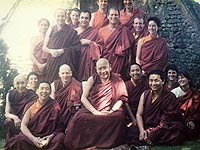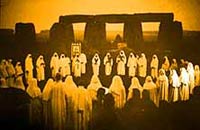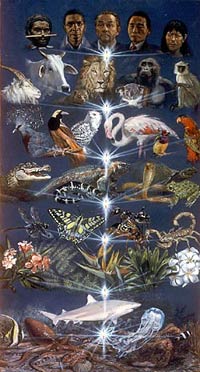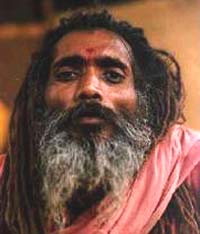
Humans and Earth, Guna and karma
|
I became an animal subjected to the gunas and my free will was replaced by the instincts. Gradually I will be elevated to the uncivilized human level. This may take me longer time if I am killed in the animal body by ignorant humans. "While rotating in the cycle of birth and death again and again in different species because of his own fruitive activities, the dependent living entity, by good fortune, may happen to become a human being. This human birth is very rarely obtained." (SB 8.22.25) "After many, many births and deaths one achieves the rare human form of life, which, although temporary, affords one the opportunity to attain the highest perfection. Thus a sober human being should quickly endeavor for the ultimate perfection of life as long as his body, which is always subject to death, has not fallen down and died. After all, sense gratification is available even in the most abominable species of life, whereas Krsna consciousness is possible only for a human being." (SB 11.9.29)
Humans in general can be roughly categorized into six general types according
to their social, cultural and spiritual advancement (Bhaktivinoda Thakura:
Vaishnava-siddhanta-mala, ch.7):  1)
Uncivilized tribes like the Pulindas (aborigines) and the Sabaras
(mountain people), etc. 1)
Uncivilized tribes like the Pulindas (aborigines) and the Sabaras
(mountain people), etc.
"Kirata, Huna, Andhra, Pulinda, Pulkasa, Abhira, Sumbha, Yavana, members of the Khasa races and even others addicted to sinful acts can be purified by taking shelter of the devotees of the Lord, due to His being the supreme power. I beg to offer my respectful obeisances unto Him." (SB 2.4.18)  2)
Civilized races with developed materialistic knowledge and science,
as well as an emphasis on industrialized production; they do not know
what is proper moral conduct, nor do they have actual faith in God; these
are the characteristics of the mlecchas (meat-eating races), etc. 2)
Civilized races with developed materialistic knowledge and science,
as well as an emphasis on industrialized production; they do not know
what is proper moral conduct, nor do they have actual faith in God; these
are the characteristics of the mlecchas (meat-eating races), etc.
"My dear Thakura Haridasa, in this age of Kali most people are bereft of Vedic culture, and therefore they are called yavanas. They are concerned only with killing cows and brahminical culture. In this way they all engage in sinful acts. (Caitanya-caritamrta, Antya 3.50)  3)
Those who have no personal God but are very fond of the natural beauty
of the material world, like the Buddhists, etc. 3)
Those who have no personal God but are very fond of the natural beauty
of the material world, like the Buddhists, etc.
"Then, in the beginning of Kali-yuga, the Lord will appear as Lord Buddha, the son of Anjana, in the province of Gaya, just for the purpose of deluding those who are envious of the faithful theist." (SB 1.3.24) "The scriptures of the Buddhist cult are chiefly based on argument
and logic, and they contain nine chief principles. Because Sri Caitanya
Mahaprabhu defeated them in their argument, they could not establish
their cult."  4)
Those whose ethics are endowed with a philosophy and faith of an imaginary
God, like the karma-vadis (worshipers of various demigods, etc.,
who do good with the hope of being elevated to higher planets. This is
called imaginary because they believe various demigods to be the Supreme
Personality of Godhead.). 4)
Those whose ethics are endowed with a philosophy and faith of an imaginary
God, like the karma-vadis (worshipers of various demigods, etc.,
who do good with the hope of being elevated to higher planets. This is
called imaginary because they believe various demigods to be the Supreme
Personality of Godhead.).
"Those whose intelligence has been stolen by material desires surrender unto demigods and follow the particular rules and regulations of worship according to their own natures." (BG 7.20) "Men of small intelligence worship the demigods, and their fruits are limited and temporary. Those who worship the demigods go to the planets of the demigods, but My devotees ultimately reach My supreme planet." (BG 7.23)  5)
Those worshipers who accept the true Lord of Creation, but do not
perform devotional service unto Him. 5)
Those worshipers who accept the true Lord of Creation, but do not
perform devotional service unto Him.
"Persons who want to advance in superior religion are advised to give up all envy of other living entities, whether in relationship to the body, words or mind. There is no religion superior to this." (SB 7.15.8) 
"Mayavada philosophy is disguised buddhism. My dear Devi, I [Shiva],
in the form of brahmana, will teach it in Kali-yuga." (Padma Purana, Uttara
khanda, 25.7)
After being born among the uncivilized humans I will be elevated among the civilized races. My further progress will depend on my guna and karma. Related:Guna table Three gunas GUNA
Sattva - "O sinless one, the mode of goodness, being purer than the others, is illuminating, and it frees one from all sinful reactions. Those situated in that mode become conditioned by a sense of happiness and knowledge." (BG 14.6) Rajas - "The mode of passion is born of unlimited desires and longings, O son of Kunti, and because of this the embodied living entity is bound to material fruitive actions." (BG 14.7) Tamas - "O son of Bharata, know that the mode of darkness, born
of ignorance, is the delusion of all embodied living entities. The results
of this mode are madness, indolence and sleep, which bind the conditioned
soul." (BG 14.8) KARMA
"Transcendental practices that do not ultimately help one realize the Supreme Personality of Godhead are useless, be they mystic yoga practices, the analytical study of matter, severe austerity, the acceptance of sannyasa, or the study of Vedic literature. All these may be very important aspects of spiritual advancement, but unless one understands the Supreme Personality of Godhead, Hari, all these processes are useless." (SB 4.31.12)
"If a human being is engaged in sinful, irreligious activities, either because of bad association or because of his failure to control his senses, then such a person will certainly develop a personality full of material desires. He thus becomes miserly toward others, greedy and always anxious to exploit the bodies of women. When the mind is so polluted one becomes violent and aggressive and without the authority of Vedic injunctions slaughters innocent animals for sense gratification. Worshiping ghosts and spirits, the bewildered person falls fully into the grip of unauthorized activities and thus goes to hell, where he receives a material body infected by the darkest modes of nature. In such a degraded body, he unfortunately continues to perform inauspicious activities that greatly increase his future unhappiness, and therefore he again accepts a similar material body. What possible happiness can there be for one who engages in activities inevitably terminating in death?" (SB 1.10.27-29) For those who are on the level of Vedic life, dharma sastras (scriptures on dharma) provide definition of the proper behavior leading to elevation. Any deviation from it is called vikarma (negative, degrading karma). Let me examine motivations directing my life and choose my further destination:
The process of elevation on the path back home, back to Godhead, is different
in different yugas (cosmic ages) as each yuga has its specific yuga-dharma
based on bhakti.
SB 2.2.15-31 describes the path from the point of view of yoga (Satya-yuga-dharma), SB 7.15.54-55 from the point of view of yajna (Treta-yuga-dharma), BG 8.23-27 from the point of view of upasana (Dvapara-yuga-dharma) and Brhad Bhagavatamrta, part 2, from the point of view of harinama-sankirtana (Kali-yuga-dharma, the process for the current age). Dharma - "The Yamadutas replied: That which is prescribed in the Vedas constitutes dharma, the religious principles, and the opposite of that is irreligion. The Vedas are directly the Supreme Personality of Godhead, Narayana, and are self-born. This we have heard from Yamaraja." (SB 6.1.40) "The supreme occupation [dharma] for all humanity is that by which men
can attain to loving devotional service unto the transcendent Lord. Such
devotional service must be unmotivated and uninterrupted to completely
satisfy the self." |
||||||||||||||||||||||||||
| Vedic cosmology |
| Please support us: |


 Universe
consists of 8,400,000 species of plants, animals and humans.
Universe
consists of 8,400,000 species of plants, animals and humans. "Material
nature consists of three modes - goodness, passion and ignorance. When
the eternal living entity comes in contact with nature, O mighty-armed
Arjuna, he becomes conditioned by these modes." (BG 14.5)
"Material
nature consists of three modes - goodness, passion and ignorance. When
the eternal living entity comes in contact with nature, O mighty-armed
Arjuna, he becomes conditioned by these modes." (BG 14.5)  Bhakti
- "In this Age of Kali, people who are endowed with sufficient intelligence
will worship the Lord, who is accompanied by His associates, by performance
of sankirtana-yajna [congregational chanting of the holy names of the
Lord]." (SB 11.5.32)
Bhakti
- "In this Age of Kali, people who are endowed with sufficient intelligence
will worship the Lord, who is accompanied by His associates, by performance
of sankirtana-yajna [congregational chanting of the holy names of the
Lord]." (SB 11.5.32) Jnana
- "Neither religious activities endowed with honesty and mercy nor knowledge
obtained with great penance can completely purify one's consciousness
if they are bereft of loving service to Me." (SB 11.14.22)
Jnana
- "Neither religious activities endowed with honesty and mercy nor knowledge
obtained with great penance can completely purify one's consciousness
if they are bereft of loving service to Me." (SB 11.14.22) Yoga
- "In this way, being purified by ritualistic sacrifices, the heart of
Maharaja Bharata was completely uncontaminated. His devotional service
unto Vasudeva, Lord Krsna, increased day after day. Lord Krsna, the son
of Vasudeva, is the original Personality of Godhead manifest as the Supersoul
[Paramatma] as well as the impersonal Brahman. Yogis meditate upon the
localized Paramatma situated in the heart, jnanis worship the impersonal
Brahman as the Supreme Absolute Truth, and devotees worship Vasudeva,
the Supreme Personality of Godhead, whose transcendental body is described
in the sastras. His body is decorated with the Srivatsa, the Kaustubha
jewel and a flower garland, and His hands hold a conchshell, disc, club
and lotus flower. Devotees like Narada always think of Him within their
hearts." (SB 5.7.7)
Yoga
- "In this way, being purified by ritualistic sacrifices, the heart of
Maharaja Bharata was completely uncontaminated. His devotional service
unto Vasudeva, Lord Krsna, increased day after day. Lord Krsna, the son
of Vasudeva, is the original Personality of Godhead manifest as the Supersoul
[Paramatma] as well as the impersonal Brahman. Yogis meditate upon the
localized Paramatma situated in the heart, jnanis worship the impersonal
Brahman as the Supreme Absolute Truth, and devotees worship Vasudeva,
the Supreme Personality of Godhead, whose transcendental body is described
in the sastras. His body is decorated with the Srivatsa, the Kaustubha
jewel and a flower garland, and His hands hold a conchshell, disc, club
and lotus flower. Devotees like Narada always think of Him within their
hearts." (SB 5.7.7)  Karma
- "Karmis are always anxious to accumulate wealth for their sense gratification,
but for that purpose they must work very hard. Yet even though they work
hard, the results are not satisfying. Indeed, sometimes their work results
only in frustration. But devotees who have dedicated their lives to the
service of the Lord can achieve substantial results without working very
hard. These results exceed the devotee's expectations." (SB 8.5.47)
Karma
- "Karmis are always anxious to accumulate wealth for their sense gratification,
but for that purpose they must work very hard. Yet even though they work
hard, the results are not satisfying. Indeed, sometimes their work results
only in frustration. But devotees who have dedicated their lives to the
service of the Lord can achieve substantial results without working very
hard. These results exceed the devotee's expectations." (SB 8.5.47) Vikarma
- "Suta Gosvami said: Maharaja Pariksit, thus being petitioned by the
personality of Kali, gave him permission to reside in places where gambling,
drinking, prostitution and animal slaughter were performed." (SB 1.17.38)
Vikarma
- "Suta Gosvami said: Maharaja Pariksit, thus being petitioned by the
personality of Kali, gave him permission to reside in places where gambling,
drinking, prostitution and animal slaughter were performed." (SB 1.17.38)


